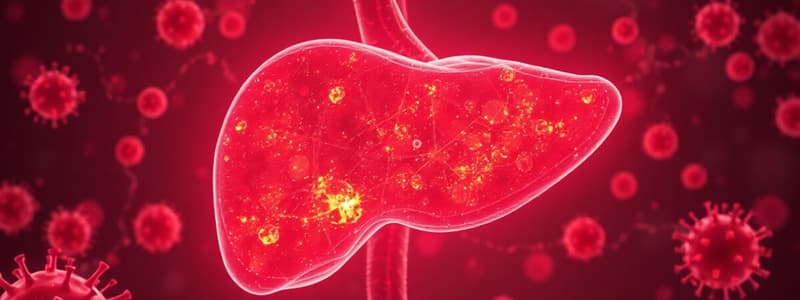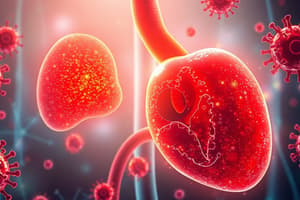Podcast
Questions and Answers
Which of the following is a potential risk factor for Hepatitis C?
Which of the following is a potential risk factor for Hepatitis C?
- Obesity
- Travel to Southeast Asia
- Blood transfusions before 1992 (correct)
- Consumption of high-sugar diets
What is a common transmission route for Hepatitis E?
What is a common transmission route for Hepatitis E?
- Healthcare exposure
- Contaminated water (correct)
- Needle-sharing
- Sexual contact
Which type of hepatitis is associated with chronic alcohol consumption?
Which type of hepatitis is associated with chronic alcohol consumption?
- Hepatitis A
- Autoimmune Hepatitis
- Hepatitis D
- Alcoholic Hepatitis (correct)
What condition increases the risk of severe illness from Hepatitis E?
What condition increases the risk of severe illness from Hepatitis E?
Which of the following is a risk factor for Non-alcoholic Steatohepatitis (NASH)?
Which of the following is a risk factor for Non-alcoholic Steatohepatitis (NASH)?
What is the primary cause of Hepatitis A?
What is the primary cause of Hepatitis A?
Which type of hepatitis requires co-infection with Hepatitis B for its transmission?
Which type of hepatitis requires co-infection with Hepatitis B for its transmission?
What triggers drug-induced hepatitis?
What triggers drug-induced hepatitis?
Which condition is associated with the accumulation of fat in hepatocytes due to metabolic dysfunction?
Which condition is associated with the accumulation of fat in hepatocytes due to metabolic dysfunction?
What is the main component causing cellular injury in alcoholic hepatitis?
What is the main component causing cellular injury in alcoholic hepatitis?
In the inflammatory response associated with hepatitis, which cells are primarily involved in targeting damaged hepatocytes?
In the inflammatory response associated with hepatitis, which cells are primarily involved in targeting damaged hepatocytes?
Autoimmune hepatitis is characterized by the immune system attacking which of the following?
Autoimmune hepatitis is characterized by the immune system attacking which of the following?
What is a common link between non-alcoholic steatohepatitis (NASH) and metabolic disorders?
What is a common link between non-alcoholic steatohepatitis (NASH) and metabolic disorders?
What is the primary consequence of persistent inflammation in the liver?
What is the primary consequence of persistent inflammation in the liver?
Which hepatitis virus requires the presence of Hepatitis B for infection?
Which hepatitis virus requires the presence of Hepatitis B for infection?
What is a significant risk factor for contracting Hepatitis B?
What is a significant risk factor for contracting Hepatitis B?
What is a potential outcome of untreated cirrhosis?
What is a potential outcome of untreated cirrhosis?
Which hepatitis is transmitted via the fecal-oral route?
Which hepatitis is transmitted via the fecal-oral route?
What is a key feature of non-viral hepatitis?
What is a key feature of non-viral hepatitis?
Chronic hepatitis infections are characterized by which of the following?
Chronic hepatitis infections are characterized by which of the following?
Which statement about hepatitis C transmission is true?
Which statement about hepatitis C transmission is true?
Flashcards
What is Hepatitis?
What is Hepatitis?
Inflammation of the liver, which can be acute or chronic.
What are some of the most common causes of Hepatitis?
What are some of the most common causes of Hepatitis?
Hepatitis A, B, C, D, and E. These are caused by viruses.
What is Alcohol-Induced Hepatitis?
What is Alcohol-Induced Hepatitis?
Caused by the toxic effects of acetaldehyde, a metabolite of alcohol.
What is Drug-Induced Hepatitis?
What is Drug-Induced Hepatitis?
Signup and view all the flashcards
What is Autoimmune Hepatitis?
What is Autoimmune Hepatitis?
Signup and view all the flashcards
What is Non-Alcoholic Steatohepatitis (NASH)?
What is Non-Alcoholic Steatohepatitis (NASH)?
Signup and view all the flashcards
How does Viral Hepatitis affect the liver?
How does Viral Hepatitis affect the liver?
Signup and view all the flashcards
Describe the inflammatory response in Hepatitis.
Describe the inflammatory response in Hepatitis.
Signup and view all the flashcards
Hepatitis
Hepatitis
Signup and view all the flashcards
Chronic Hepatitis
Chronic Hepatitis
Signup and view all the flashcards
Fibrosis
Fibrosis
Signup and view all the flashcards
Cirrhosis
Cirrhosis
Signup and view all the flashcards
Liver Failure
Liver Failure
Signup and view all the flashcards
Hepatitis A Transmission
Hepatitis A Transmission
Signup and view all the flashcards
Hepatitis B Transmission
Hepatitis B Transmission
Signup and view all the flashcards
Hepatitis C Transmission
Hepatitis C Transmission
Signup and view all the flashcards
Viral Hepatitis
Viral Hepatitis
Signup and view all the flashcards
Hepatitis D (HDV)
Hepatitis D (HDV)
Signup and view all the flashcards
Alcoholic Hepatitis
Alcoholic Hepatitis
Signup and view all the flashcards
Drug-Induced Hepatitis
Drug-Induced Hepatitis
Signup and view all the flashcards
Autoimmune Hepatitis
Autoimmune Hepatitis
Signup and view all the flashcards
Study Notes
Hepatitis Overview
- Hepatitis is inflammation of the liver, which can be acute or chronic.
- It can result from viral infections (Hepatitis A, B, C, D, and E), alcohol abuse, toxins, autoimmune disorders, and certain medications.
Most Likely Causes
- Viral Hepatitis
- Hepatitis A: Caused by Hepatitis A virus (HAV).
- Hepatitis B: Caused by Hepatitis B virus (HBV).
- Hepatitis C: Caused by Hepatitis C virus (HCV).
- Hepatitis D: Caused by Hepatitis D virus (HDV) only infects people already infected with HBV.
- Hepatitis E: Caused by Hepatitis E virus (HEV).
- Non-viral Hepatitis
- Alcohol-induced hepatitis: Caused by acetaldehyde (alcohol metabolite).
- Drug-induced hepatitis: Caused by hepatotoxic medications (acetaminophen, NSAIDs, antibiotics).
- Autoimmune hepatitis: Immune system attacks hepatocytes (liver cells), often with antinuclear antibodies (ANA) and anti-smooth muscle antibodies (ASMA).
- Non-alcoholic steatohepatitis (NASH): Fat accumulation in hepatocytes due to metabolic dysfunction, often seen in obesity, diabetes, and metabolic syndrome.
Pathophysiology
- Infection/Exposure:
- Viral hepatitis: Viruses infect hepatocytes, triggering an immune response.
- Alcoholic hepatitis: Acetaldehyde disrupts hepatocytes, promoting oxidative stress and inflammation.
- Autoimmune hepatitis: T cells attack hepatocytes, leading to immune-mediated destruction.
- Inflammatory Response:
- Immune system targets infected/damaged hepatocytes, leading to recruitment of macrophages, cytokines, and natural killer (NK) cells.
- This process leads to hepatocyte necrosis, liver enzyme release (AST, ALT), and fibrosis (scar tissue).
Liver Damage and Scarring
- Persistent inflammation leads to fibrosis, impairing blood flow and bile excretion.
- Ongoing fibrosis can progress to cirrhosis, altering liver architecture and causing portal hypertension.
- Cirrhosis increases the risk of hepatocellular carcinoma (HCC).
Chronic Hepatitis
- Chronic hepatitis (e.g., Hepatitis B, C, D) can persist due to the immune system's inability to eliminate the virus, leading to ongoing inflammation, fibrosis, and a higher risk of cirrhosis and liver cancer.
Disease Transmission
- Hepatitis A: Fecal-oral through contaminated food, water, or close contact.
- Hepatitis B: Contact with infected blood, bodily fluids (semen, vaginal fluid), sexual contact, and vertical transmission.
- Hepatitis C: Contact with infected blood, often through needle sharing, blood transfusions, and contaminated medical equipment.
- Hepatitis D: Only infects individuals already infected with HBV, transmitted the same ways as HBV.
- Hepatitis E: Fecal-oral, similar to Hepatitis A but more dangerous in pregnant women.
- Non-viral Hepatitis: Not infectious, occurring due to toxins, alcohol, or autoimmune processes.
Risk Factors
- Viral Hepatitis: Travel to endemic areas (poor sanitation), contaminated food/water, unprotected sex, needles sharing, healthcare exposure, vertical transmission, etc.
- Alcoholic Hepatitis: Chronic alcohol consumption.
- Drug-induced Hepatitis: Use of hepatotoxic drugs.
- Autoimmune Hepatitis: Presence of autoimmune diseases.
- NASH: Obesity, Type 2 diabetes, metabolic syndrome, poor diet.
Studying That Suits You
Use AI to generate personalized quizzes and flashcards to suit your learning preferences.



